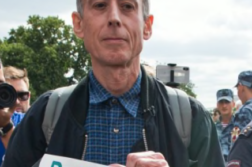Not long ago, I wrote in these pages about issues facing the Bangladesh GLBT community (“Activism Struggling to be Born,” Nov.-Dec. 2013), having worked there for many years. When I returned to the UK last year, I wondered how much British Asians identified with these problems and what others they have to deal with.
British Asians live between two worlds. Most are second- or third-generation, born in the UK rather than abroad. But much of their cultural heritage is fixed firmly in India, Pakistan, or Bangladesh and is thus quite foreign to Britain. Most still have family in Asia, and some British Asian men will go back to marry a woman chosen by their family and bring her back to the UK. But in these countries of South Asia, homosexuality is taboo, if not actually illegal. According to The Sunday Times last year, a recent poll in Pakistan found that only two percent of the population believed homosexuality should be accepted by society. A Gallup poll in Britain in 2009 found that none of the 500 British Muslims interviewed believed that homosexuality was “morally acceptable.” In India, section 377—a law from the days of British rule making homosexuality illegal—was thrown out by a high court ruling in 2009 but then reinstated by the Supreme Court in 2013, leaving a trail of legal confusion. Thus Asian Brits who are gay live in a country that’s broadly tolerant but tend to come from families and communities that frown on their sexual orientation.
Not surprisingly, this leads to distress and even psychological damage for many British Asian GLBT people.
Ken Powell is author of Sonali’ (2014) and of the forthcoming Try Not to Laugh: How to Revise, Memorise and Survive Exams.





